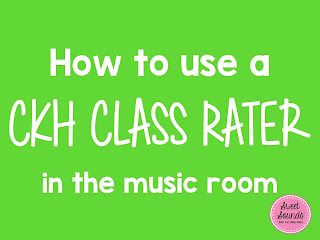Today I'm sharing about how I adapted Class Raters for music class, how to prep your students for critical thinking, plus a bonus extension activity!
Class Rater Basics
You might have used rubrics before in class, but you may want to discuss them again when you first start using a rater. We look for very specific things at first that can be easily tracked.
At the end of class, the rater gives the whole group a score (any scale you choose - I use either 1-4 or 1-10) based on the criteria they were looking/listening for.
*Yes - I actually hand-pick the rater the first few times. After that, I can use randomization, but I want to get some success under our belts with students that I know can handle this.
Behavior Rater:
- 1st grade: the behavior rater might be on the lookout for blurters that day, or the number of times someone had to sit out / sit down for misbehavior
- 3rd grade: they might be tracking the number of times the teacher had to say "Give me 5" to gain their attention
- 5th grade: they might be looking for a specific number of times the class lost points for playing an instrument out of turn (and whether it was an improvement from the last class)
When they give their short report at the end of the class, they can say something like, "I noticed that we had less blurts this time," or "We only lost points twice for playing out of turn," etc. They never mention names.
Academic Rater:
For the academic rater, they look at what they worked on during class and they get to determine if the class understood or had trouble. If the class has been having trouble stopping on the correct beat, or following the conductor's instructions, that's what we will track.
When they give their short report, they might say, "When we sang Dance Josey in canon the last time, our class had more people on the steady beat than the first time we sang it," or "When we held our imaginary beach balls, everyone moved them up and down at the same time by the end of class." (Don't your students answer in beautifully composed complete sentences?! ha!)
Prepping for Critical Listening
To prepare the students to be raters, they have to be used to listening critically to their performances, and paying attention to behavior in class. You have to practice it. (Shocking, I know!)
Before I assign a rater (or sometimes the same day), we practice rating smaller chunks of class. It's so fast to say, "Close your eyes. Give me a 3, 2, or 1 that tells how you think we did on ____."
I'm usually pretty specific about what we're looking for so that they only have to think about one thing at first.
Basic questions to start with:
- How did we stay together on the beat?
- How did we all start/stop?
- How was our blend? (Could you hear one person singing louder than the rest?)
- How did we follow the game directions? (or more specifically, did we all clap with our right hand on top, etc.)
- How was our balance? (Could you hear the sung melody louder than the hand clapping?)
- Did you hear any extra claps in the rests?
- Did anyone start talking after the song ended?
More advanced - You can take this as far as your musical skills will allow! You can address intonation, articulation, style, or any other concept or skill that you are working towards. Ask about two skills at the same time (Did we blend our voices and sing the correct dynamic level at measure 5?), or build on vocabulary words that you just learned.
I was AMAZED at how much better my students got just by bringing attention to the little things that make music come alive. If they've never been taught that we breathe together before the first word, how will they ever know they're supposed to be doing that?
"One Thing" - Extension Activity
Take this idea one step further by having students tell you the "one thing" that was best/worst about that segment of class. Most of the time I prompt with the phrase, "One thing we did well; one thing we could do better?"
Sometimes I have to spin what they say a little to make it constructive for the class. "So you're saying that we sing better when our fingers aren't in our noses. Great!" BAHAHA.
Most of the time I get a wide range of answers - if you have a positive reinforcement system in your class (you should!), give more points for more critical answers/deeper thinking. This subconsciously prompts the other students to listen more carefully the next time to see if they could hear the same thing.
How do you help your students to listen more critically to their own music?
Share in the comments or connect over on FB!
Let’s Connect!





No comments:
Post a Comment